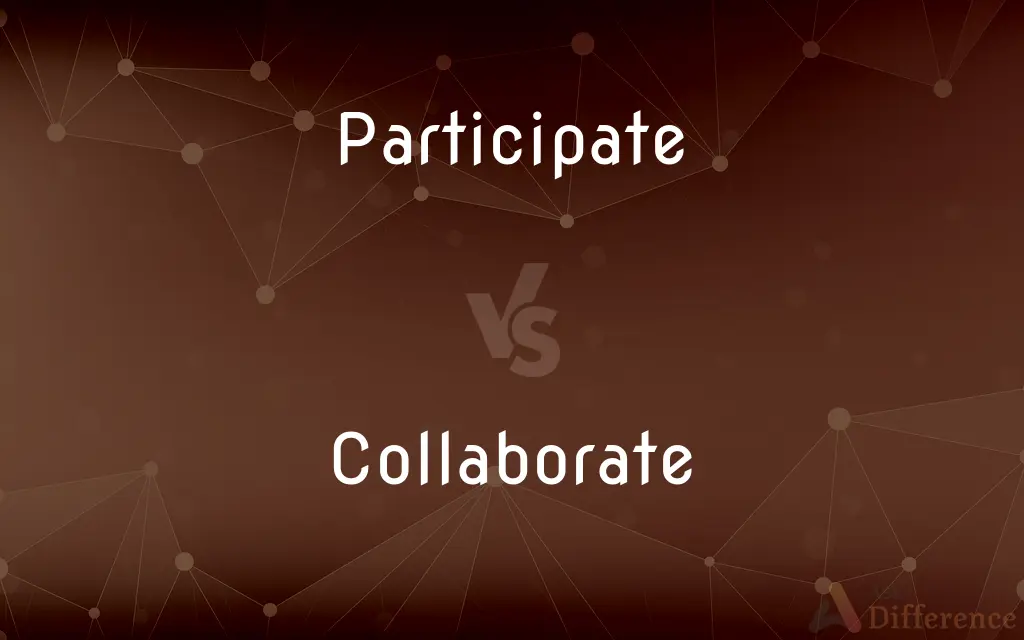Participate vs. Collaborate — What's the Difference?
By Maham Liaqat & Fiza Rafique — Published on March 6, 2024
Participating involves taking part in an activity or event, often individually within a group setting. Collaborating means working together with others towards a common goal, emphasizing teamwork and shared effort.

Difference Between Participate and Collaborate
Table of Contents
ADVERTISEMENT
Key Differences
Participation implies engagement in an activity, where the focus is on the act of joining or being involved, regardless of the level of contribution or the impact on the outcome. It can be passive, such as attending a lecture, or active, like contributing ideas in a workshop. On the other hand, collaboration requires a more active, coordinated effort among individuals or groups, where the contributions are directed towards achieving a shared objective. Collaboration involves communication, planning, and shared responsibilities, highlighting the interdependent nature of the work.
While participating in an activity, individuals may have varying degrees of influence on the final outcome, with their role being more about presence and individual contribution within a broader context. In contrast, when collaborating, each member's input is integral to the project's success, often requiring compromise, negotiation, and consensus-building to integrate the diverse contributions effectively.
Participation can be a stepping stone to collaboration, as individuals who take part in activities may eventually engage more deeply with the work and others involved, moving towards a more collaborative relationship. However, the transition from participation to collaboration is not automatic and requires a shift in mindset and purpose from simply being present to actively contributing towards a collective goal.
The context in which these terms are used also highlights their differences. Participation is often encouraged in educational settings, community events, or any situation where inclusion and involvement are valued. Collaboration, however, is more specific to contexts where joint effort is necessary to accomplish tasks, solve problems, or create something new, such as in the workplace, in academic research, or in creative projects.
Finally, the outcome of participation versus collaboration can be markedly different. Participation may lead to individual satisfaction, learning, or personal growth. Collaboration, by fostering a sense of unity and shared purpose, not only achieves these individual benefits but also culminates in a collective product or solution that reflects the combined efforts and talents of all involved.
ADVERTISEMENT
Comparison Chart
Definition
Engaging in an activity, often individually within a group setting.
Working together towards a common goal, emphasizing teamwork.
Level of Contribution
Can be passive or active, with varying degrees of influence.
Requires active, coordinated effort and shared responsibilities.
Outcome Focus
Individual presence and contribution.
Achieving a shared objective through integrated efforts.
Process
May not require coordinated effort with others.
Involves communication, planning, and consensus-building.
Context
Educational settings, community events, general involvement.
Workplaces, academic research, creative projects where joint effort is necessary.
Compare with Definitions
Participate
To take part in an activity or event.
She decided to participate in the workshop to learn new skills.
Collaborate
To work jointly with others towards a shared goal.
The team collaborated to complete the project ahead of the deadline.
Participate
Involvement in a group setting without necessarily contributing to a common goal.
He participates in the meetings by listening and absorbing information.
Collaborate
Involves shared effort, communication, and planning.
They collaborate regularly to ensure the success of their initiatives.
Participate
The act of joining in without the requirement of teamwork.
Participating in the survey helps the company gauge employee satisfaction.
Collaborate
Requires active coordination and contribution from all members.
Collaborating on the research paper allowed them to combine their expertise.
Participate
Engaging in activities individually within a broader context.
They encouraged all employees to participate in the volunteer day.
Collaborate
Emphasizes teamwork and the integration of diverse contributions.
The artists collaborated on a mural that reflected their collective vision.
Participate
Can involve various levels of engagement, from passive to active.
Participating in class discussions can greatly enhance your understanding of the topic.
Collaborate
Culminates in a collective product or solution.
Their collaboration resulted in an innovative solution to the problem.
Participate
To be active or involved in something; take part
Participated in the festivities.
Collaborate
To work together, especially in a joint intellectual effort.
Participate
To share in something
If only I could participate in your good fortune.
Collaborate
To work together with others to achieve a common goal.
Let's collaborate on this project, and get it finished faster.
Wikipedia is a website where anyone can collaborate.
Participate
(intransitive) To join in, to take part, to involve oneself (in something).
Collaborate
To work together with another toward a common goal, especially in an intellectual endeavor; as, four chemists collaborated on the synthesis of the compound; three authors collaborated in writing the book.
Participate
(obsolete) To share (something) with others; to transfer (something) to or unto others.
Collaborate
Work together on a common enterprise of project;
The soprano and the pianist did not get together very well
We joined forces with another research group
Participate
To have a share in common with others; to take a part; to play a role; to partake; - followed by in, formerly by of; as, to participate in a debate; to participate in a discussion.
So would he participate of their wants.
Mine may come when menWith angels may participate.
Participate
Become a participant; be involved in;
Enter a race
Enter an agreement
Enter a drug treatment program
Enter negotiations
Common Curiosities
What is the main difference between participating and collaborating?
The main difference lies in the level of engagement and purpose: participating involves being part of an activity often individually, while collaborating requires working together actively towards a shared goal.
Is collaboration always the goal in a group setting?
Not always; the goal depends on the context. Collaboration is sought when a common objective requires joint effort, while participation may suffice in more inclusive or individual-focused contexts.
How does collaboration enhance the outcome of a project?
Collaboration integrates diverse skills, perspectives, and efforts, leading to more innovative solutions and a product that reflects the collective talent of the group.
Can participation lead to collaboration?
Yes, participation can be a stepping stone to collaboration as individuals engage more deeply with the work and others involved, moving towards a cooperative relationship.
What skills are important for effective collaboration?
Important skills include communication, problem-solving, adaptability, and the ability to work well within a team.
How do you measure the success of collaboration?
Success can be measured by the achievement of the shared goal, the quality of the final product, and the satisfaction of team members with the collaborative process.
How do you encourage collaboration in a team that’s used to only participating?
Encouraging collaboration can involve setting clear shared goals, fostering open communication, and emphasizing the value of each team member’s contributions.
What are the challenges of transitioning from participation to collaboration?
Challenges may include overcoming individual silos, building trust among team members, and developing a shared vision.
What is the impact of collaboration on learning and innovation?
Collaboration can enhance learning and innovation by exposing individuals to different perspectives and approaches, fostering creativity and problem-solving.
Can you participate without collaborating?
Yes, one can participate in an activity without actively collaborating, such as attending a lecture or workshop without contributing to a joint effort.
What role does leadership play in fostering collaboration?
Leadership is crucial in setting expectations for collaboration, providing resources and support, and modeling collaborative behavior.
How can technology facilitate collaboration?
Technology can facilitate collaboration through communication tools, project management software, and platforms that support real-time cooperation and sharing.
How does collaboration differ in virtual versus in-person settings?
Collaboration in virtual settings requires more intentional communication and use of digital tools, while in-person collaboration may benefit from spontaneous interactions and non-verbal cues.
How do you resolve conflicts in a collaborative environment?
Resolving conflicts involves open communication, seeking to understand different perspectives, and finding common ground or compromise that aligns with the group’s goals.
Can collaboration occur in competitive environments?
Yes, collaboration can occur in competitive environments when individuals or groups recognize the mutual benefits of working together towards a common goal.
Share Your Discovery

Previous Comparison
IMAX 3D vs. Real 3D
Next Comparison
Basic Disk vs. Dynamic DiskAuthor Spotlight
Written by
Maham LiaqatCo-written by
Fiza RafiqueFiza Rafique is a skilled content writer at AskDifference.com, where she meticulously refines and enhances written pieces. Drawing from her vast editorial expertise, Fiza ensures clarity, accuracy, and precision in every article. Passionate about language, she continually seeks to elevate the quality of content for readers worldwide.













































